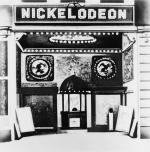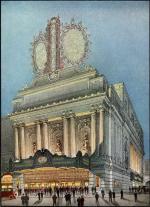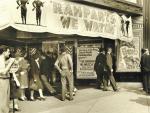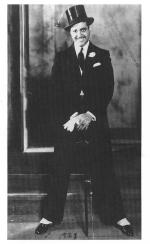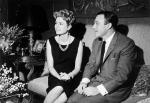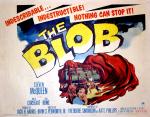Chapter 2: Motion Pictures
"I am very doubtful there is any commercial future in it, and fear that they will not earn their cost. These Zoë tropic devices are too sentimental a value to get the public to invest in."
Thomas Edison
In the 1800s, inventors on both sides of the Atlantic Ocean became fascinated with the idea of creating pictures that moved. In the 1880s Philadelphia painter Thomas Eakins teamed with San Francisco photographer Eadweard Muybridge to produce rapid shots of people and horses in motion, including multiple exposures of Eakins running in the nude. In 1891 the indomitable Thomas Edison applied for patents on both a motion picture camera and projector, and although the Wizard of Menlo Park was at first skeptical about the commercial potential of the new technology, motion pictures soon exploded in popularity.
In 1903 Edison cameraman
The new business of "canned drama" quickly emerged into a major international industry. Mass production made motion pictures much cheaper than live performances. To get its product to consumers, the new industry also required first regional and then national systems of distribution and sale. In the 1890s, "Professor"
At the dawn of the twentieth century, Pittsburgh was a booming industrial metropolis. And there in 1905 John Harris and Harry Davis partitioned off part of their penny arcade and charged a nickel for entrance into what may well have been the nation's first theater devoted exclusively to the showing of motion pictures. Soon "nickelodeons," a term coined in Pittsburgh, were popping up across the nation. In Youngstown, Ohio, butcher Ben Warner sold his store horse so that his sons could buy a Kinetoscope projector to show films in western Pennsylvania coal and steel towns. The
As the motion pictures grew in popularity, storefront nickelodeons gave way to motion picture palaces. And once again Pennsylvanians were in the forefront. In 1908 door-to-door salesman Samuel "Roxy" Rothapfel opened a nickelodeon in the backroom of a saloon in Forest City, PA. Thirty years later Rothapfel owned a chain of theaters that included some of the nation's largest motion picture palaces, and managed New York's Radio City Music Hall, the nation's largest theater.
To appeal to its primarily urban and working-class audiences, the early filmmakers made movies filled with romance, sexual titillation, slapstick humor, satires of the rich and powerful, and other popular fare. Convinced from the start that motion pictures were a menace to the nation's morals, critics organized their opposition. In 1911 Pennsylvania became the first state to pass a film censorship law. First led by its influential secretary
The critics, however, could do little to hold back Americans' love affair with the movies, or young Pennsylvanians' desires to direct films and appear on the silver screen.
From Philadelphia came siblings
After a series of financial disasters forced Lubin in 1914 to close his Betzwood and Philadelphia operations, Pennsylvania lost its only major film production company. But in the decades that followed, filmmakers continued to use Pennsylvania stories and locations for their motion pictures.
With its gritty urban neighborhoods, historic landscapes, and low cost of production, Pennsylvania in the late 1900s attracted a growing number of filmmakers. The Molly Maguires was filmed in Eckley in 1970; Rocky (1976) made Philadelphia an attractive location for feature films and television series; Slap Shot (1977) and The Deer Hunter (1978) drew Hollywood to western Pennsylvania, and Witness (1985) placed Harrison Ford among the Lancaster County Amish. To attract more filmmakers, Governor Milton Shapp established the Pennsylvania Film Office.
Philadelphia in 1985 and Pittsburgh in 1990 also established film offices that facilitated the production of dozens of feature films, and a smaller number of network television series. In 1994 Philadelphia became the only major studio film to be shot entirely in Philadelphia. Both Tom Hanks and Bruce Springsteen won Oscars for their work in it. Founded in 1991, the Philadelphia Festival of World Cinema emerged as a major national festival. In 1999, M. Night Shyamalan's The Sixth Sense earned seven Oscar nominations. Since then, Shamayalan, who was raised in the Philadelphia suburb of Penn Valley, has based his production company in Conshohocken, giving the Commonwealth its first major film production company since the collapse of the Lubin Films in 1914.







